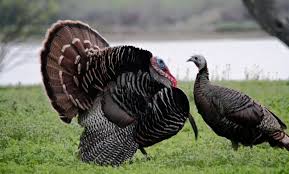Turkeys are far more than a holiday meal. They are working animals that contribute in real, measurable ways to how farms operate and how land stays healthy. Most people think of turkeys only in the context of food, but their role in agriculture covers pest control, soil improvement, economic development, and sustainable farming. Understanding what turkeys bring to the table, beyond the dinner table, helps us see why they deserve more attention in modern agricultural conversations.
Turkeys have been part of farming for thousands of years. Indigenous peoples in Mexico and Central America domesticated wild turkeys about 2,000 years ago. From that point forward, turkeys became woven into food systems, cultural practices, and rural economies. When European settlers arrived in North America, they quickly recognized the value of these birds. By the late 1600s, turkey farming was already common across New England. Over the centuries, the industry grew, adapted, and diversified. Today, turkey farming spans small heritage operations and large commercial facilities, each playing a different but important role in feeding communities and supporting local economies.
What makes turkeys especially useful in agriculture is their natural behavior. They forage, scratch the ground, eat insects, and move across land in ways that benefit the soil and surrounding crops. Farmers who raise turkeys often see fewer pests, healthier soil, and reduced reliance on chemical inputs. These benefits are not small or incidental. They are practical advantages that make turkeys a smart fit for sustainable farming systems.
This article looks at the specific ways turkeys contribute to agriculture, from soil health and pest control to economic value and environmental impact. It also covers turkey breeds, production practices, and the challenges farmers face in this industry.
1. Historical Significance of Turkeys in Farming
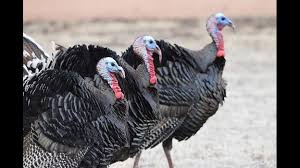
Turkeys have been part of human agriculture for over 2,000 years. Native to North America, they were first domesticated by indigenous peoples in Mexico and Central America. These early farmers used turkeys for food, feathers, and cultural ceremonies. Feathers featured in clothing and rituals, while meat and eggs provided nutrition.
When European settlers arrived in the 16th century, turkey farming expanded rapidly. The bird’s adaptability made it popular on farms across New England. By the 19th century, better breeding practices and improved transportation helped turkey farming grow into a proper industry. The rise of Thanksgiving traditions in the United States also created steady demand for turkeys, driving the development of commercial farms focused on seasonal production.
In the 20th century, industrialization changed how turkeys were raised. Large-scale operations prioritized efficiency and volume. This raised concerns about animal welfare and environmental impact that continue to shape the industry today. In response, many farmers have returned to heritage breeds and sustainable practices that reflect older, more balanced approaches to turkey farming.
2. Economic Contributions of Turkey Farming
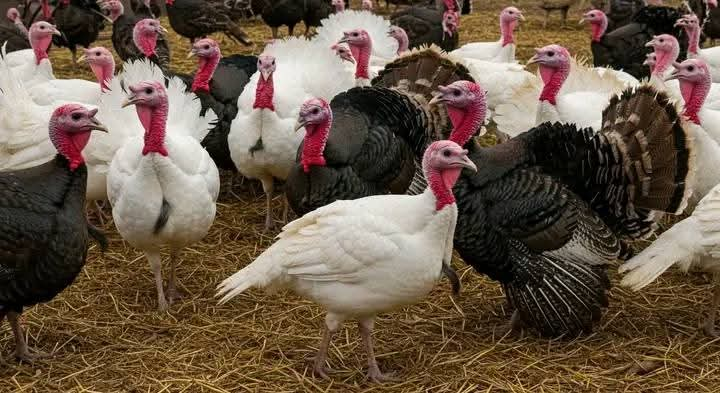
Turkey farming supports local and national economies in several direct ways. Here is a breakdown of the key economic contributions:
i. Job Creation: Turkey farming creates jobs across farming, processing, and distribution. From farm laborers to managers in processing plants, the industry provides livelihoods to many workers, especially in rural areas.
ii. Revenue Generation: Sales of live turkeys, processed products, and by-products generate consistent revenue for farmers and rural businesses. This income strengthens local economies and supports community development.
iii. Export Opportunities: Turkey meat has demand in international markets. Producers who meet quality standards can access export markets, bringing in foreign income and expanding their business reach.
iv. Support for Ancillary Industries: Turkey farming drives demand for feed production, veterinary services, equipment manufacturing, and logistics. These linked industries benefit from the growth of turkey farming, creating a broader economic ripple effect.
v. Sustainable Practices: Farmers who adopt efficient and eco-friendly practices attract consumers who prefer responsibly produced food. This approach can open access to premium markets and support long-term profitability.
3. Nutritional Benefits of Turkey Meat
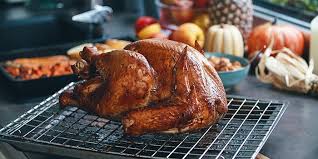
Turkey meat is one of the more nutritious protein sources available. Here is what makes it stand out:
i. High-Quality Protein: Turkey is rich in protein that supports muscle growth and tissue repair. It is easily digestible and works well in a balanced diet.
ii. Low in Fat: Skinless turkey breast is low in saturated fat. This makes it a good option for people managing cholesterol or looking after heart health.
iii. Rich in Vitamins and Minerals: Turkey provides B vitamins, including B6 and B12, along with niacin and selenium. These nutrients support energy production, immune health, and general wellbeing.
iv. Weight Management: High protein and low fat content make turkey a practical food for weight management. Protein keeps you full longer, which can reduce overall calorie intake over time.
v. Versatile in Cooking: Turkey fits into many recipes, from roasted holiday birds to ground turkey in everyday dishes. This flexibility makes it easy to include in a healthy, varied diet.
Read Also: 12 Medicinal Health Benefits of Oats (Avena Sativa)
4. Turkey Breeds and Their Agricultural Importance

Different turkey breeds serve different purposes in agriculture. Choosing the right breed depends on the farming system, market, and sustainability goals.
i. Broad Breasted White: This is the most common commercial breed. It grows fast and produces a high yield of meat, making it a practical choice for large-scale production.
ii. Heritage Breeds (e.g., Bourbon Red, Narragansett): Heritage breeds grow more slowly but offer distinctive flavors. They are well suited to sustainable and free-range farming systems and appeal to consumers who prefer naturally raised meat.
iii. Royal Palm: This breed is ornamental, known for its striking black and white feathers. It is not primarily a meat bird but attracts interest in specialty and exhibition markets.
iv. Bronze Turkeys: Historically significant and known for their bronze-colored feathers, Bronze turkeys produce flavorful meat and can be raised for both production and exhibition purposes.
v. Narragansett Turkeys: Appreciated for adaptability and meat quality, Narragansett turkeys thrive in free-range environments, making them a good fit for sustainable farms.
5. Turkey Production Practices
Running a successful turkey farm takes planning and consistent management. The main practices that support good production include:
i. Breeding and Selection: Farmers choose breeding stock based on growth rate, disease resistance, and meat quality. Strong genetic selection improves flock performance over time.
ii. Housing and Environment: Turkeys need adequate space, proper ventilation, and protection from predators. Clean, comfortable housing reduces stress and supports healthy development.
iii. Feeding Programs: A balanced, nutritionally complete diet is essential. Feed requirements change at different growth stages. Fresh water must also be available at all times.
iv. Health Management: Regular health checks, vaccinations, and biosecurity measures help prevent disease outbreaks. A clear health management plan is essential for maintaining flock welfare.
v. Harvesting and Processing: Humane handling during harvest protects both animal welfare and meat quality. Food safety standards must be followed throughout processing to ensure a safe product reaches consumers.
vi. Marketing and Sales: Farmers need clear marketing strategies to reach their target buyers, whether local consumers, restaurants, or grocery stores. Participating in farmers’ markets and community events can build brand visibility and customer trust.
6. The Role of Turkeys in Pest Control
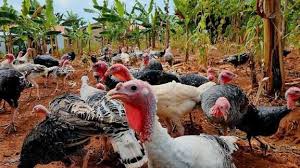
One of the most practical benefits turkeys offer on a farm is natural pest control. Their foraging behavior makes them effective at keeping pest populations in check.
i. Natural Pest Predators: Turkeys eat insects, larvae, and weeds as they forage. This reduces the need for chemical pesticides and supports healthier crops with lower production costs.
ii. Reduction of Disease Vectors: Turkeys consume insects that carry diseases affecting crops and livestock. By controlling these insect populations, they help reduce the spread of illness across the farm.
iii. Contribution to Biodiversity: Integrating turkeys into farm ecosystems promotes biodiversity. A more diverse farm environment is generally more resilient and better equipped to manage pests naturally.
Read Also: 12 Medicinal Health Benefits of Emilia Sonchifolia (lilac tasselflower)
7. Turkeys and Soil Health Enhancement
Beyond pest control, turkeys actively improve soil health through their natural behavior. Farmers using turkeys in pasture systems often see measurable improvements in soil quality.
i. Natural Fertilizers: Turkey droppings are rich in nitrogen and other nutrients. When turkeys roam freely, their manure enriches the soil and supports healthy plant growth, functioning as a natural, cost-effective fertilizer.
ii. Soil Aeration: As turkeys scratch and forage, they loosen compacted soil. This improves water infiltration, soil structure, and root growth in surrounding plants.
iii. Weed Control: Turkeys eat weed seeds and young plants, reducing weed competition without the need for herbicides. This natural management approach keeps crop areas cleaner and more productive.
8. Integrating Turkeys in Crop Rotation Systems
Crop rotation is a proven strategy for maintaining soil health and managing pests. Adding turkeys to the rotation brings additional benefits.
i. Enhancing Crop Diversity: Turkeys can graze on crop remnants between planting cycles, promoting nutrient cycling and reducing pest buildup. This supports a more diverse and balanced farm operation.
ii. Breaking Pest Cycles: Turkeys feed on pests that build up in fields during one crop cycle, reducing infestations in the next. This disrupts pest life cycles without chemical intervention.
iii. Improved Soil Quality: A combination of turkey manure and crop residue adds organic matter to the soil over time. This improves soil fertility and creates better growing conditions for future crops.
9. Environmental Impact of Turkey Farming
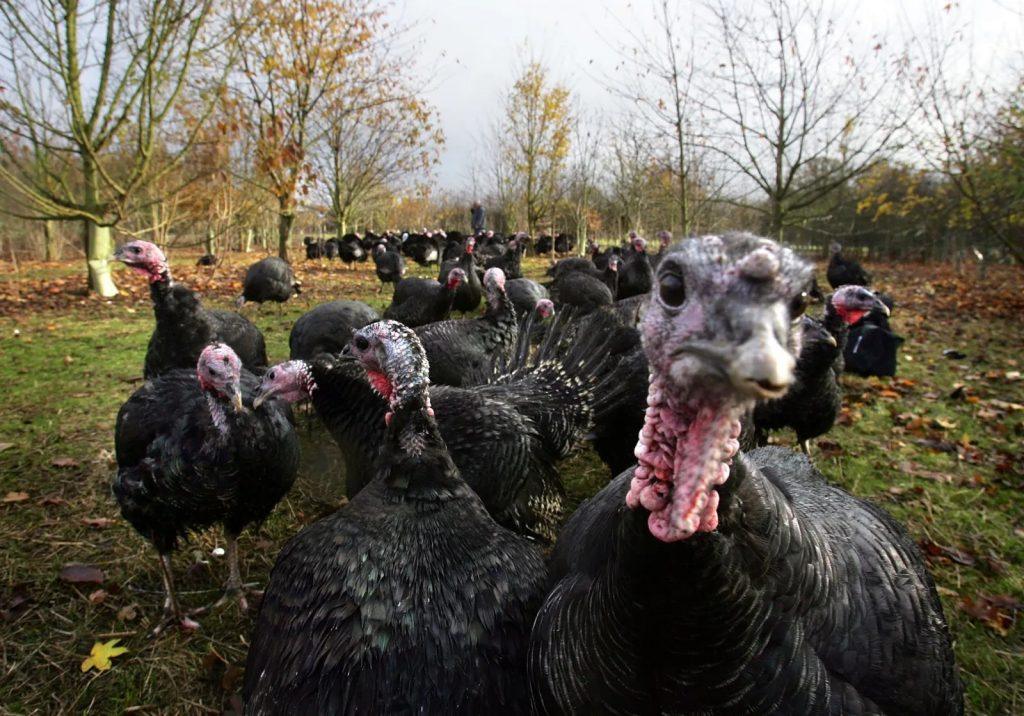
When managed well, turkey farming can have a positive environmental footprint.
i. Reduced Chemical Usage: Using turkeys for pest control and soil enrichment reduces the need for synthetic fertilizers and pesticides. This leads to less chemical pollution in soil and waterways.
ii. Sustainable Farming Practices: Rotating turkeys with crops, managing grazing areas responsibly, and handling waste properly all contribute to more sustainable land use over time.
iii. Carbon Sequestration: Healthy, well-managed soils store more carbon. By improving soil health through organic matter and microbial activity, turkey farming can support efforts to reduce greenhouse gas emissions.
10. Challenges Facing Turkey Farmers
Turkey farming is not without difficulties. Farmers face real and ongoing challenges that require planning and adaptability.
i. Market Fluctuations: Price changes driven by consumer demand and market competition can make long-term planning difficult. Profitability can vary significantly from year to year.
ii. Disease Management: Turkey flocks are vulnerable to diseases like avian influenza and salmonella. Strong biosecurity practices and ongoing education are essential to keep flocks healthy.
iii. Environmental Regulations: Farmers must comply with regulations on waste management, nutrient runoff, and animal welfare. Meeting these requirements can be costly and challenging for smaller operations.
iv. Access to Resources: Many farmers, particularly in rural areas, struggle to access quality feed, veterinary services, and equipment. Limited resources can hold back productivity and growth.
v. Competition from Other Protein Sources: Plant-based proteins and alternative meats are growing in popularity. Turkey farmers need to market their products clearly and compete effectively in a changing food landscape.
Summary on The Roles of Turkeys in Agriculture
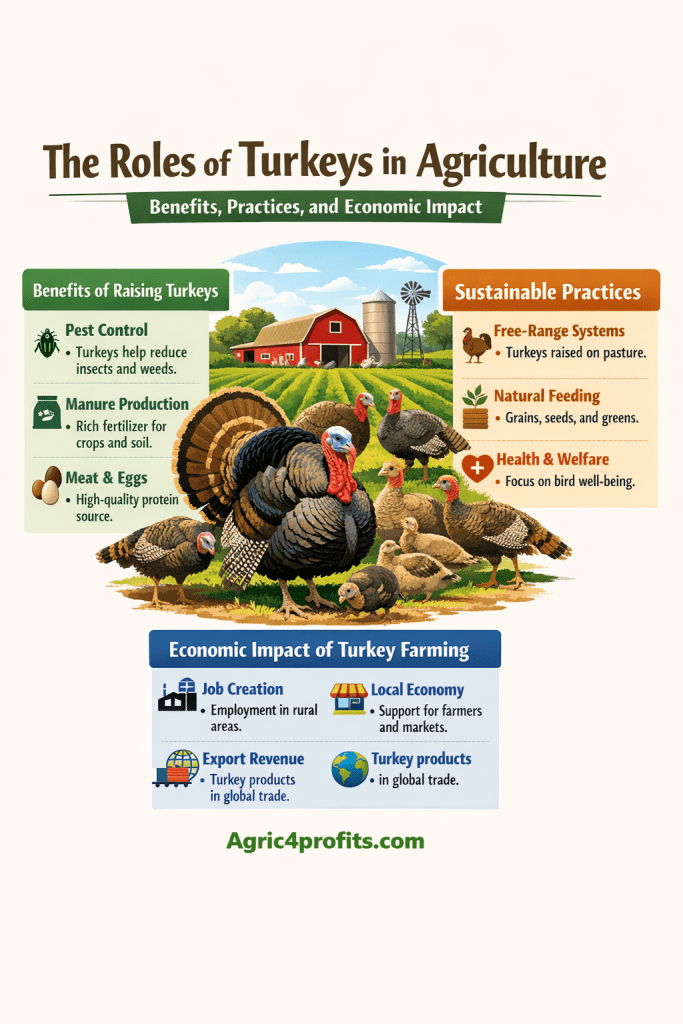
| Topic | Key Points |
|---|---|
| Historical Significance | Domesticated over 2,000 years ago; played roles in food, culture, and trade across centuries |
| Pest Control | Turkeys forage on insects and larvae, reducing chemical pesticide use and supporting crop health |
| Soil Health | Their manure fertilizes soil; scratching aerates ground and improves water infiltration |
| Crop Rotation | Turkeys break pest cycles and add organic matter when integrated into rotation systems |
| Economic Contributions | Creates jobs, generates revenue, supports export markets, and drives demand in linked industries |
| Nutritional Benefits | High in protein, low in fat, rich in B vitamins, niacin, and selenium |
| Turkey Breeds | Broad Breasted White for commercial use; heritage breeds for sustainable and specialty markets |
| Production Practices | Covers breeding, housing, feeding, health management, processing, and marketing |
| Environmental Impact | Reduces chemical use, supports sustainable land management, and aids carbon sequestration |
| Challenges | Market volatility, disease risks, regulatory compliance, resource access, and competition |
Frequently Asked Questions About The Roles of Turkeys in Agriculture
1. What are the main roles turkeys play in agriculture?
Turkeys contribute to pest control, soil health improvement, crop rotation systems, and rural economic development. Their natural foraging behavior reduces reliance on chemical inputs and supports more sustainable farming.
2. How do turkeys help with pest control on farms?
Turkeys eat insects, larvae, weed seeds, and small pests as they forage. This reduces pest populations naturally and lowers the need for chemical pesticides, which benefits both crops and the environment.
3. Can turkey manure be used as fertilizer?
Yes. Turkey droppings are rich in nitrogen and other nutrients, making them an effective organic fertilizer. When turkeys roam pastures freely, their manure spreads across the land and enriches soil fertility over time.
4. What turkey breeds are best for sustainable farming?
Heritage breeds like Bourbon Red, Narragansett, and Bronze turkeys are well suited to sustainable farming. They adapt well to free-range systems and produce flavorful meat that appeals to consumers looking for naturally raised products.
5. How do turkeys contribute to rural economies?
Turkey farming creates jobs in farming, processing, and distribution. It generates revenue through product sales and supports ancillary industries like feed production, veterinary services, and equipment supply, all of which strengthen local economies.
6. What are the nutritional benefits of eating turkey meat?
Turkey is high in quality protein, low in saturated fat, and rich in B vitamins, niacin, and selenium. It supports muscle health, heart health, and immune function, and is versatile enough to fit into many types of meals.
7. How does integrating turkeys into crop rotation systems help farmers?
Turkeys graze on crop residue and pests between planting cycles. This disrupts pest life cycles, adds organic matter to the soil, and improves overall soil quality, making it better suited for the next crop.
8. What are the biggest challenges turkey farmers face today?
Key challenges include market price volatility, disease management, environmental regulation compliance, limited access to resources in rural areas, and growing competition from plant-based and alternative protein products.
9. Is turkey farming considered environmentally friendly?
When managed responsibly, yes. Turkey farming can reduce chemical use, support sustainable land practices, and even contribute to carbon sequestration in the soil. Poor management, however, can lead to nutrient runoff and other environmental issues.
10. What is the difference between commercial and heritage turkey breeds?
Commercial breeds like the Broad Breasted White grow quickly and produce large amounts of meat. Heritage breeds grow more slowly but offer richer flavor and are better suited to free-range, sustainable farming systems. Both serve important but different roles in the market.
Do you have any questions, suggestions, or contributions? If so, please feel free to use the comment box below to share your thoughts. We also encourage you to kindly share this information with others who might benefit from it. Since we can’t reach everyone at once, we truly appreciate your help in spreading the word. Thank you very much for your support and for sharing!
Read Also: Classification of Products and Marketing Strategies for Consumer Goods

